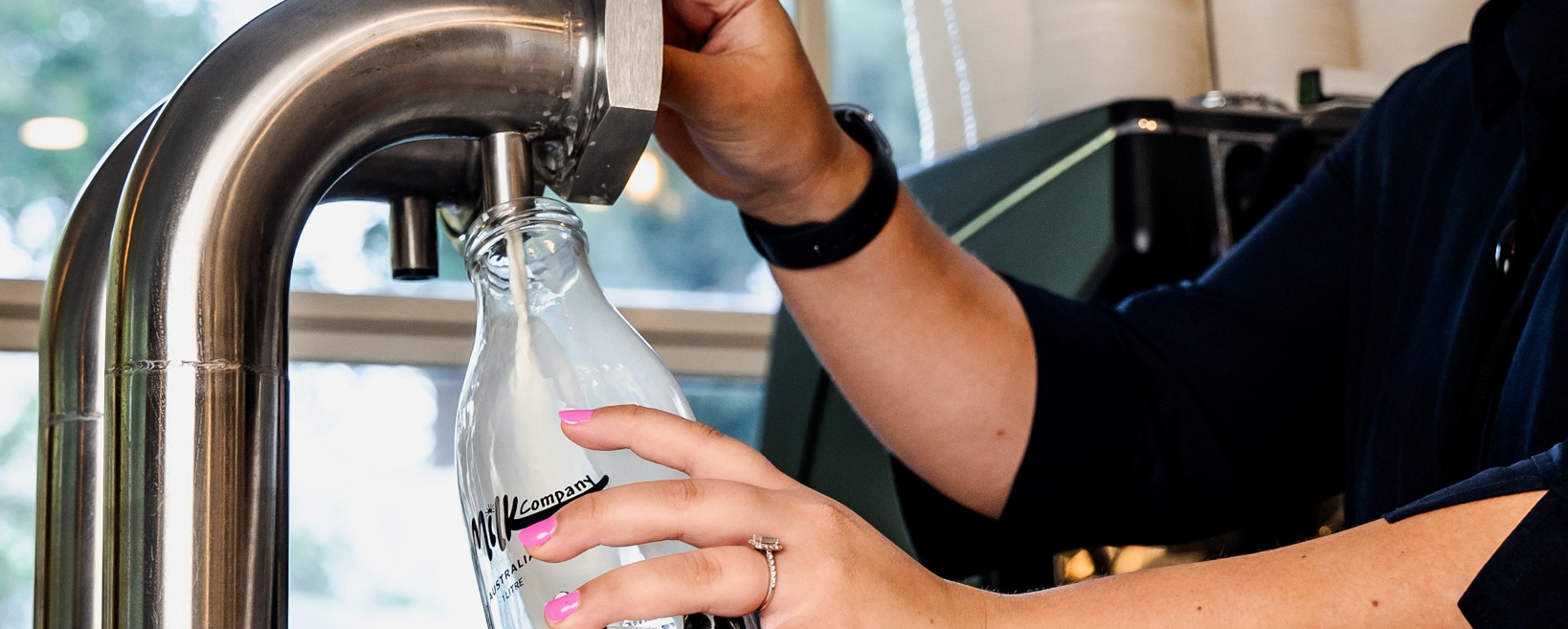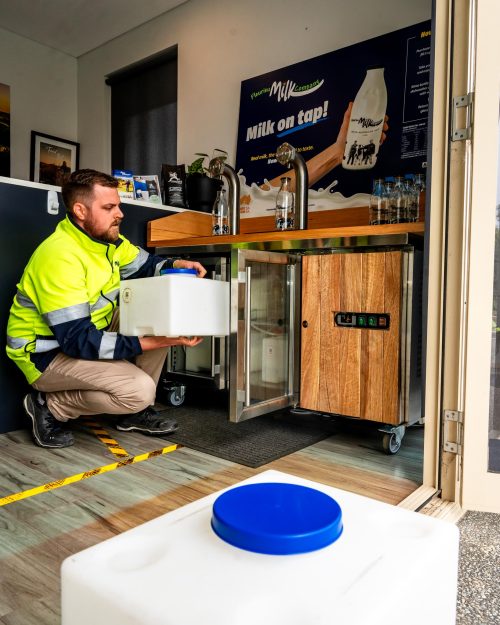
Fleurieu Milk and Adelaide Zoo: Avoiding single-use plastic milk bottles
A case study for using procurement practices to transition to a circular economy.
The transition
The Adelaide Zoo, known for its environmental commitments and conservation efforts, gained Plastic Free Champion accreditation in November 2022. The Zoo then set its sights on finding an alternative to behind-the-counter single-use plastic milk bottles. Collaborating with Quality Catering (the Zoo’s café operator) and Fleurieu Milk, the Zoo introduced The Udder Way Keg at its Fig Tree Café in March 2024.
What is The Udder Way Keg?
The Udder Way Keg is an 18-litre reusable milk container (see below). Each use avoids 9 single-use 2-litre (450g) plastic bottles. With an estimated 8 to 10 year (800 to 1,000 use) lifespan, and fully recyclable, it reduces plastic waste for milk suppliers and cafés.

Fleurieu Milk’s reusable journey
For years, customers have asked Fleurieu Milk to bring back milk in refillable glass bottles, instead of the current single-use plastic bottles. After careful consideration, the company decided the risks from glass breakage and other processing challenges outweighed the benefits.
They were then approached by The Udder Way, an innovative small business from Tasmania. The company offers a system for safely storing and distributing milk in reusable kegs instead of single-use plastic bottles. Cafés can fill milk jugs directly from the tap. Customers can also purchase milk in refillable glass bottles, which they clean according to instructions before returning for a refill.
Impressed with The Udder Way’s capabilities and environmental credentials, Fleurieu Milk invested a quarter of a million dollars to upgrade its Myponga factory, so the kegs could be cleaned and filled safely.
The system was designed by its engineering and food safety teams and built by local Fleurieu Peninsula business Complete Custom Fabrication. It also developed a proprietary tap system that better suits its needs. The entire process took 18 months to implement.
Fleurieu Milk’s milk-on-tap system was launched at the Willunga Markets in October 2023 and was well-received by customers. It has since been installed at more than 40 cafés and other popular locations, such as the Adelaide Central Market, Adelaide Showgrounds Farmers Market, SA Aquatic Centre, Adelaide Oval, and Adelaide Zoo. The available milk options have also increased to include full cream, low-fat, and lactose-free.
So far, the initiative has avoided the production of more than 140,000 single-use plastic bottles.
Introduction at Adelaide Zoo
Adelaide Zoo’s introduction of the milk-on-tap system was a 4-way collaboration between the zoo, Fleurieu Milk, and Quality Catering, the zoo’s café operator.
In March 2024, Fleurieu Milk taps were installed at the Fig Tree Café, located at the heart of the zoo. It needed a $20,000 investment to extend countertops, move coffee machines to fit the milk taps, and install fridges. This was co-funded by Fleurieu Milk, highlighting its commitment to the initiative. The installation was completed in just 6 weeks, with minimal disruption to the café.
Outcomes and benefits
After 4 months of use, the zoo has avoided more than 4,000 single-use plastic milk bottles. Customers and visitors have expressed a sense of pride in supporting a local SA business and the initiative’s sustainability. Zoo staff have also supported the transition by using refillable glass milk bottles in lunchrooms and offices.
Although the new system and supplier have slightly increased milk costs, the café has found that Fleurieu Milk’s superior quality enhances the flavour of coffee and other beverages. Additionally, its excellent stretching properties mean that less milk is needed per cup.
Making coffee has also become more efficient, as the system enables precise measurement, reducing the likelihood of milk waste from overpouring or bottled milk being out of the fridge for too long.
For Steve Finlayson from Quality Catering:
“Introducing the milk-on-tap system achieved the company’s shared goals of improving customer experience and showcasing our commitment to sustainability and the zoo’s conservation efforts.”

Future prospects
Discussions are underway to introduce the system at other zoo locations, including Monarto Safari Park. The project’s success has also caught the attention of groups such as the World Association of Zoos and Aquariums (WAZA). It will be featured in the September 2024 issue of the WAZA magazine, highlighting Adelaide Zoo’s leadership in plastic reduction initiatives in the industry.
Fleurieu Milk is continuing to expand its milk-on-tap locations in both cafés and retail settings. It is also working on projects to track the environmental impact of reusable bottles.
The Udder Way has since rolled out systems in New Zealand and is working on other international locations. They are also exploring being able to supply other products, such as juice, using the system.
Conclusion
The introduction of a milk-on-tap system at Adelaide Zoo represents a positive step towards circular economy practices in the hospitality industry. The transition greatly reduces plastic waste while maintaining product quality. The initiative highlights how circular transitions can benefit both consumers and the environment.
About this case study
This case study was prepared by Rawtec for Green Industries SA. It is part of a series of case studies aimed at empowering businesses and organisations to make changes to their procurement practices to transition to a circular economy.
Acknowledgements
We would like to express our gratitude to Adelaide Zoo, Fleurieu Milk, The Udder Way, and Quality Catering for sharing their insights and data, which formed the basis of this case study.




